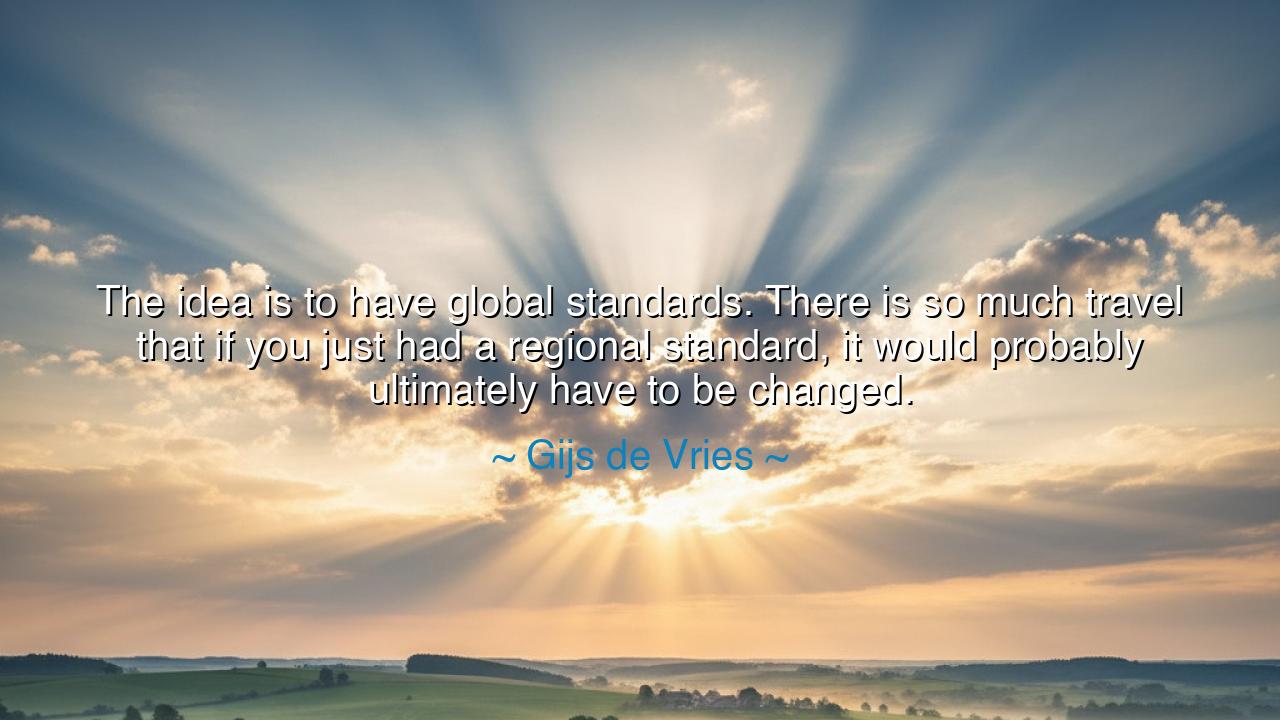
The idea is to have global standards. There is so much travel
The idea is to have global standards. There is so much travel that if you just had a regional standard, it would probably ultimately have to be changed.






So spoke Gijs de Vries, a voice of governance and vision in an age of boundless connection: “The idea is to have global standards. There is so much travel that if you just had a regional standard, it would probably ultimately have to be changed.” At first, his words seem bound to the realm of policy and regulation, yet beneath them beats a truth as ancient as the building of cities and the binding of empires. He teaches us that harmony cannot endure if it is fractured, that what touches all people must be guided by unity, not division.
The phrase global standards is more than technical; it is the pursuit of order in a world ever more intertwined. In ages past, tribes could live by their own customs, each village bound to its own rhythm. But as caravans crossed deserts, as ships spanned seas, as iron rails and wings of steel shrank the earth, humanity became one household. In such a household, separate rules breed chaos. The traveler who meets one law in the morning and another in the evening finds only confusion. But a global standard brings clarity, continuity, and peace, turning chaos into concord.
Consider the story of the Roman Empire, which stretched across continents, binding together peoples of countless tongues and traditions. Rome did not endure by leaving each province with entirely separate measures of coin or law. Instead, it brought forth standards: of roads, of weights, of law, of citizenship. These did not erase diversity but created unity strong enough for trade, travel, and justice to flourish. And when Rome fell, the absence of common standards left Europe in centuries of confusion and fragmentation. Thus, de Vries’ wisdom is old as empire: unity of measure ensures unity of spirit.
Even in more recent times, the creation of time zones and the adoption of international aviation rules show this truth. Before standardization, railroads crashed, and journeys collapsed into disarray, because each town kept its own clock. Only when humanity agreed to a shared measure of time could the age of modern travel safely unfold. What was once regional had to become universal, for the world had grown too connected to endure separate rhythms.
And so the message is clear: in a world of constant travel, where ideas, goods, and people flow without ceasing, the wisdom of clinging to local standards fades. What begins as sufficient for one region soon proves inadequate when confronted by the whole. Thus, the regional must yield to the global, lest men forever chase after shifting boundaries. The call is not for uniformity of culture, but for harmony of foundation—standards that allow diversity to thrive without collapsing into discord.
For our lives, too, there is lesson here. Within families, communities, and nations, if each soul insists on their own measure without regard for others, harmony dissolves. Just as the world requires global standards to travel in safety, so relationships require shared values, common commitments, and mutual agreements. To walk together, one must agree on the path; to build together, one must agree on the foundation. Without such shared standards, even love falters, and even noble projects collapse.
Practically, this means seeking agreement in the essentials. In business, it means setting rules that cross borders. In community, it means seeking principles that all can honor. In daily life, it means finding with others a shared measure of truth, respect, and justice, so that cooperation endures. Do not cling to what divides when the greater task requires unity. Instead, choose the standards that lift all and create peace across difference.
Thus, the words of de Vries shine with ancient force: “The idea is to have global standards.” For without them, confusion reigns and chaos spreads. With them, the road becomes clear, the journey possible, and the world—though vast—feels as one. Let us then strive to be builders of unity, seekers of shared truths, and travelers upon the same great road, where many peoples walk together under the banner of one harmonious order.






AAdministratorAdministrator
Welcome, honored guests. Please leave a comment, we will respond soon